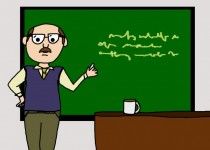Education
Nothing Worth Learning Can Be Taught
Teaching can provide clues for worthwhile learning but doesn’t produce it.
Updated June 11, 2023 Reviewed by Hara Estroff Marano

I find myself increasingly annoyed by the frequent equation of teaching with learning, heard not just from school authorities but also from journalists and others who seem to assume, thoughtlessly, that learning is something that occurs chiefly if not entirely in school and is the product of teaching.
We hear statements like, “Because of COVID students lost a year of learning.” I was once invited into a PBS radio debate on the question, “Should summer, for children, be devoted to play or to learning?” My debate opponent was a leader of an organization that was lobbying to extend the school year through the summer because "so much learning is lost in the summer." Somehow it wasn’t obvious to either the program host or my debate opponent that lots of real learning occurs in play and lots of fake learning occurs in school.
I first began thinking about the disconnect between teaching and learning decades ago, when I started teaching at Boston College and began to realize that whatever students might be learning in my classes had relatively little to do with what I believed I was teaching. That concern, among other things, prompted me to invite Peter Kugel, a Boston College colleague from the Computer Science Department, to give a talk in the Psychology Department about teaching and learning from the perspective of a computer scientist. I knew he had been thinking about the concept of learning at a basic level in relation to his computer science research. He titled his talk, “Nothing Worth Learning Can Be Taught,” and he subsequently published an article with that title (Kugel, 1979).
The title is a variation of this famous quote from Oscar Wilde (1908): “Education is an admirable thing, but it is well to remember from time to time that nothing that is worth knowing can be taught.” It expresses an idea presented in various ways by many who have thought deeply about teaching and learning, including Plato, Kierkegaard, Carl Rogers, and John Holt, all of whom are referenced in Kugel’s article.
What Is Worth Learning?
Like many statements that might be seen by some as profound and by others as fatuous, the degree to which Kugel’s and Wilde’s claim is true depends on definitions.
First, what is meant by worth learning? I think, for Kugel and for others making similar claims, something is worth learning if it affects the learner’s actual behavior in the real world in a beneficial way. There is a kind of artificial way, within the schooling context, that something is “worth learning” if it helps a person pass a test and get good school grades (and thereby eventually be done with school). But that’s just an artifact of the school system. You can pass tests simply by repeating what the teacher said, without having learned anything that affects any other aspect of your behavior. I’ll limit “worth learning” to include only things that would be worth learning even if school tests and grades didn’t exist. The same reasoning also leads me to exclude learning that simply helps a person perform well in Trivial Pursuit.

And then there’s the concept of teaching or taught. Kugel (who died in October 2022) was known as a great teacher. Students sought his courses. I don’t think he felt his teaching was worthless. I think he would say that, while teaching doesn’t produce learning, it can play a role in learning, just like any other experience a learner has in the world. Real learning (learning something worth learning) is not passive absorption of information in such a way that all you can do with it is parrot it back. It is always an active process that requires thought and initiative on the part of the learner. Such learning is always a creative act of discovery. Events that the learner experiences—including sometimes words or images presented by a teacher—are stimuli that can help, as clues to the discovery, but those aren’t what produces the discovery. The learner produces it.
Among the things that you and I probably agree are worth learning, for most people in our culture, are how to read and how to calculate with numbers when such calculations are useful. So, let’s examine Kugel’s premise in relation to reading and math learning.
Application to Learning to Read
Most people today seem to believe that people learn to read because they are taught to do so. Perhaps you have seen the bumper sticker, “If you can read this, thank a teacher.” Historically, this is a relatively new belief. In the 18th and early 19th century, prior to the advent of compulsory schooling, a high percentage of people in Western Europe and America could read, and it was well accepted that if you were growing up in a literate family, where reading was part of your environment, you would learn to read whether or not you were deliberately taught (Bowles & Gintis, 2000; Thomas, 2017).
There is also ample evidence, from research in recent times, that children pursuing Self-Directed Education commonly learn to read with no deliberate teaching and even evidence that deliberate teaching often slows down or interrupts the process of learning to read (see here and here, and Gray, 2016, and Pattison, 2017).
There is also reason to believe that so-called dyslexia is commonly the result of trying to teach reading to children who have not yet developed an interest in it, are not yet ready to engage their intellects with it, and are made anxious by the imposed pressure to the point that they develop a mental block against reading (here and here). Children learn to read when they become intellectually engaged with reading and are ready to make the necessary discoveries. Then they look for clues, wherever they can find them, that help them make the discoveries that ultimately allow them to become fluent readers. Some of those clues may or may not come from the words or demonstrations of a teacher.
Application to Learning Mathematics
Many years ago, when I was regularly teaching statistics to social science majors, I came to the realization that almost no students had any understanding of the mathematics they had been taught in high school. These were students at a selective university (Boston College), most of whom had received A in their high school math courses. A few remembered how to carry out the procedures, but they had no idea why the procedures worked or why or when one might want to use them. In a questionnaire that I had them fill out anonymously, the majority claimed to suffer from “math phobia,” which I suspect developed from the stress of having to put on a show of learning what they really hadn’t learned.
In one of my early posts on this blog (here), I described a remarkable experiment conducted in the early 20th century in Manchester, New Hampshire, in which students in some schools were not taught any math until 6th grade—no adding, subtracting, multiplying, dividing. The finding was that, by the beginning of 6th grade, those taught no math performed better on math story problems—problems that involved reasoned use of numbers—than those who had the usual math classes all along.
The lead researcher, who also happened to be the superintendent of Manchester schools, concluded that the teaching of math had the effect of “chloroforming” the students’ minds for anything that involved numbers, such that they lost their capacity for common sense when numbers appeared. One of the most consistent characteristics of our educational system is that it ignores good research when the findings don’t fit the prejudices. That experiment has never been repeated and I see no evidence that it is ever discussed in schools of education.
In another post (here) I described the results of an informal study of how unschooled children learn math concepts without teaching, as a result of everyday natural experiences with numbers and calculations and, sometimes, as a result of their fascination with mathematical patterns. Without the forced teaching, they don’t develop math phobia, and they appear quite able to learn whatever math they need or wish to know when they need or wish to know it.
In yet another post (here), I presented evidence that, during summer vacation from school, students forget some of the rote mathematical procedures they had learned the previous school year but gain more in mathematical reasoning, per month, than they do when school is in session.
Again, I think all this is evidence that real mathematical learning is not the result of teaching but the result of interest and engagement. An interested and engaged person might well use a teacher as a resource, much as he or she might use a book or anything else, but the initiative and active effort comes from the learner, not the teacher.
A real science of education would devote a lot more effort to understanding the ways that children naturally learn and how to provide environments supportive of that learning, and a lot less effort to the study and development of teaching practices. Education is conducted by learners, not teachers.
----
And now, what do you think about this? … This blog is, in part, a forum for discussion. Your questions, thoughts, stories, and opinions are treated respectfully by me and other readers, regardless of the degree to which we agree or disagree. Psychology Today no longer accepts comments on this site, but you can comment by going to my Facebook profile, where you will see a link to this post. If you don't see this post near the top of my timeline, just put the title of the post into the search option (click on the three-dot icon at the top of the timeline and then on the search icon that appears in the menu) and it will come up. By following me on Facebook you can comment on all of my posts and see others' comments. The discussion is often very interesting.
References
Bowles, S. & Gintis, E. (2000). The origins of mass public education. Ch. 33 in Roy Lowe (ed.), History of education: major themes. Volume II: Education in its social context. London: RoutledgeFlamer.
Gray, P. (2016). Children’s natural ways of educating themselves still work: even for the three Rs. In D.C. Geary & D.B. Berch (eds), Evolutionary perspectives in child development and education pp 67-93. Springer.
Kugel, P. (1979). Nothing worth learning can be taught. Improving College and University Teaching, 27, 5-9.
Pattison, H. (2017). Rethinking learning to read. Shrewsbury, UK: Education Heretics Press.
Thomas, A. (2017). Forward to H. Pattison, Rethinking learning to read.
Wilde, O. (1908). The critic as artist. Intentions, 3rd edition. Methuen & Co.




